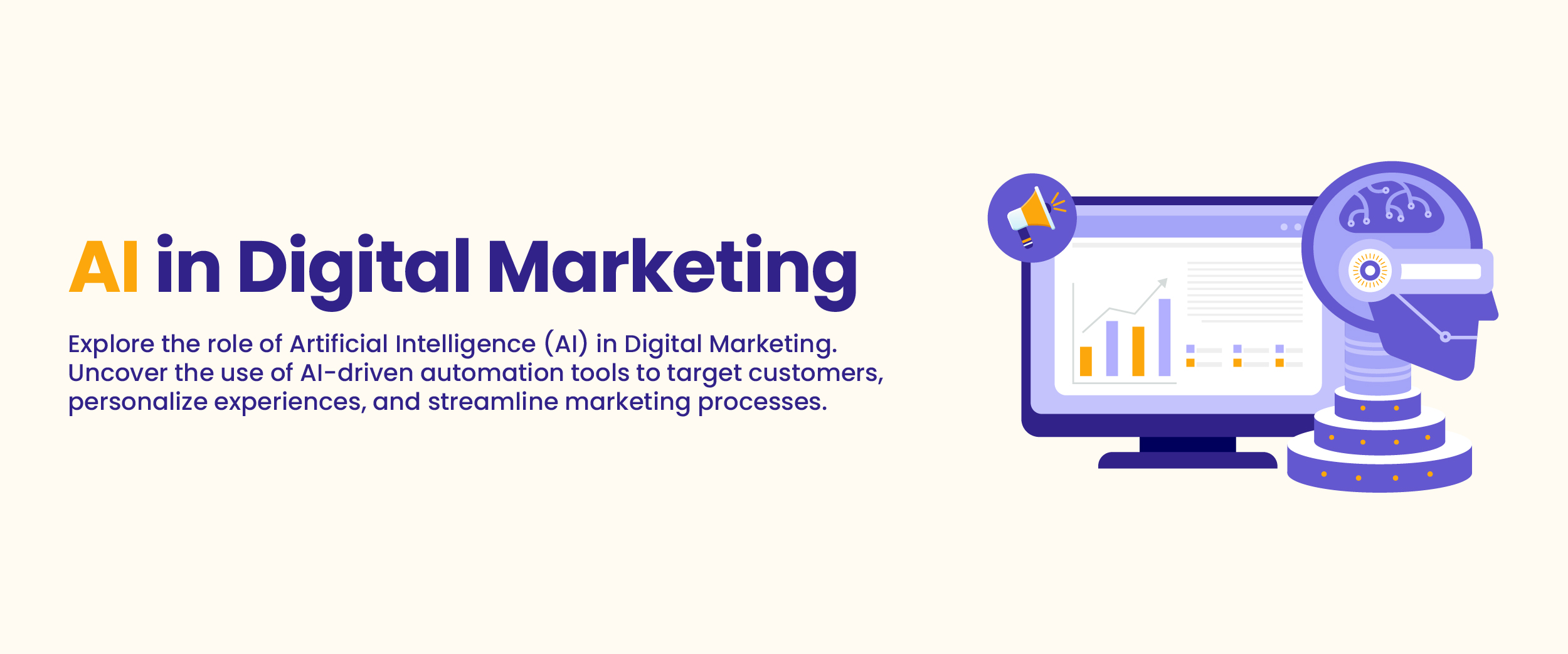AI in Digital Marketing- Revolutionizing the Way of Businesses
In today’s digital age, businesses are constantly seeking innovative ways to connect with their customers and stay ahead of the competition. An undeniable game changer in computerized advertising is Artificial Intelligence (AI). A technological marvel. This cutting-edge innovation creates major disruptions with its exceptional capabilities to analyze massive data sets efficiently, automate tasks, and deliver tailored experiences to users.
In this blog, we will discuss the role of AI in digital marketing. We will delve into its contributions from personalized customer experiences to enhanced targeting and segmentation. By examining the benefits that AI brings we hope to gain a deeper understanding of its impact in this field.
Understanding AI in Digital Marketing
Artificial intelligence in the world of digital marketing refers to the progress made in computer systems to perform tasks that traditionally necessitate human intellect. It involves a range of technologies such as machine learning, natural language processing, and predictive analytics.
These developments empower marketers to automate processes, gain valuable insights from data, and provide personalized experiences to their customers. You can learn more about digital marketing from an online digital marketing course.
Benefits of AI in Digital Marketing
AI brings several advantages to digital marketing. Let’s explore some of the key benefits.
1. Personalized Customer Experiences
AI technology allows marketers to enhance customer experiences through:
- The use of extensive data. By examining customer behavior, preferences, and demographics.
- AI creates personalized messaging and product recommendations.
- offers that connect with individuals.
- A high level of customization promotes improved customer engagement and satisfaction, leading to business growth in the long run.
For example, Amazon’s algorithm uses artificial intelligence calculations to suggest items based on a customer’s browsing and purchase history.
2. Enhanced Targeting and Segmentation
Artificial intelligence can delve into:
- Client information and unveil unforeseen trends, providing marketers with valuable insights to refine their tactics and execute more accurate campaigns.
- By harnessing these discoveries effectively, businesses can create personalized content that strikes a chord with distinct customer segments.
- This targeted strategy fosters meaningful engagement and boosts overall marketing efficacy significantly.
For example, Facebook uses artificial intelligence for ad targeting as a means of studying customers’ socioeconomic backgrounds, interests, and behaviors.
3. Improved Lead Generation and Conversion
Artificial intelligence can:
- Analyze customer data and predict the possibility of conversion.
- Allows marketers to concentrate their efforts on leads that have a high potential for conversion.
For Example, Salesforce’s Einstein AI platform incorporates chatbots to assist with lead qualification and conversion.
4. Efficient Data Analysis and Insights
Artificial intelligence algorithms provide marketers with:
- A powerful tool for effective data analysis and insights.
- These algorithms extract valuable and meaningful insights from a vast amount of data.
- Allow advertisers to make informed decisions based on data.
- Leveraging these algorithms, advertisers can improve their campaigns and uncover untapped opportunities for business growth and success.
For example, By harnessing the potential of AI-driven algorithms, Google Analytics equips advertisers with vital knowledge of website traffic, user behavior, and conversion rates.
Get along with the latest AI trends in digital marketing with our digital marketing course with placement.
Examples of AI Applications in Digital Marketing
Let’s explore some real-world examples of how AI is used in digital marketing.
1. Chatbots for Customer Support
Artificial intelligence-powered chatbots have become a crucial component of modern businesses, and revolutionizing customer service. Their capability to handle numerous queries, assist customers in discovering products, and facilitate transactions ensures uninterrupted support. This leads to improved customer satisfaction and overall excellence.
For example, Bank of America has Erica, an intelligent virtual assistant that leverages artificial intelligence, to offer clients support with their financial requirements.
2. Recommendation Engines for Personalized Offers
Online retailers are aided in providing personalized product recommendations to customers by analyzing their browsing and purchase history. This tailored approach not only enhances customer satisfaction. But also boosts sales and nurtures long-term loyalty. By harnessing the power of recommendation engines.
For example, Netflix uses advanced artificial intelligence algorithms to recommend movies and TV shows based on a user’s viewing history and preferences.
3. Predictive Analytics for Campaign Optimization
Artificial intelligence algorithms provide advertisers with the ability to analyze historical campaign data and make well-informed predictions about future marketing efforts.
For example, Adobe sensei, an artificial intelligence marketing platform developed by Adobe, assists marketers in enhancing their advertising campaigns through the analysis of past data and the provision of predictions on campaign performance.


Tools and Platforms Powered by AI in Digital Marketing
Several artificial intelligence-powered tools and platforms have emerged to assist marketers in their digital marketing jobs. Let us see a few of them.
1. Social Media Management
Artificial intelligence tools have proven to be worthy in the world of social media management as they effectively analyze data, identify emerging trends and provide valuable insights. By automating various processes.
2. Content Creation and Curation
AI algorithms play a significant role in content creation and curation offering numerous advantages to marketers. They not only generate fresh and inventive content ideas but also streamline the content creation process. Allowing marketers to save precious time.
3. Email Marketing Automation
The landscape of business-customer interactions is transforming as Email Marketing Automation takes center stage. Leveraging the power of advanced artificial intelligence, organizations can arrange laser-focused email campaigns that resonate with each individual’s unique preferences.
4. SEO and SEM Optimization
The field of Search Engine Optimization (SEO) and Search Engine Marketing (SEM) has experienced a remarkable transformation with the emergence of AI-controlled tools.
Overcoming Challenges and Ethical Considerations
Although AI presents numerous advantages, marketers also have to confront certain challenges and ethical considerations.
1. Data Privacy and Security
Advertisers are committed to safeguarding users’ information protection and security. This necessitates taking steps to guarantee that sensitive data remains well protected from any form of unauthorized access or exploitation. By taking impactful measures. Advertisers can focus their efforts on securing data integrity while preventing potential breaches or threats.
2. Avoiding Algorithmic Biases
Algorithmic biases in AI can potentially create unfair outcomes in the realm of digital marketing. It is of utmost importance to introduce measures that endorse fairness and inclusivity to mitigate this issue. By ensuring the utilization of diverse training data regularly conducting bias testing and offering transparent explanations for decisions made by AI we can make significant progress toward establishing a more equitable digital marketing landscape.
3. Transparency in AI-driven Processes
Transparency plays a vital role in artificial intelligence-driven processes, particularly for advertisers intending on building trust with their customers. These operations are presented understandably and logically allowing users to comprehend how decisions are arrived at.
4. Responsible AI Practices
To ensure accountability and contribute to a more positive and fair technological landscape it is of utmost importance for businesses to adopt AI practices. This entails developing and implementing AI systems that are guided by a robust ethical framework. To do this businesses must carefully assess the potential impacts on both individuals and society as a whole and take proactive measures to mitigate any potential harm.
5. Compliance with Regulations
To establish trust and demonstrate ethical behavior marketers should ensure that they adhere to the principles of compliance with regulations, which oversee artificial intelligence and information security. By following these standards. Organizations showcase their commitment to protecting customer data and promoting responsible use of technology.
Conclusion
When implemented AI in digital marketing it becomes a valuable asset. Offering businesses the opportunity to connect with their customers in more meaningful ways. With personalized experiences and efficient data analysis, AI is revolutionizing the marketing industry. As AI continues to evolve, marketers need to harness its true potential, overcome obstacles and utilize its power to gain a competitive edge in the digital world.







